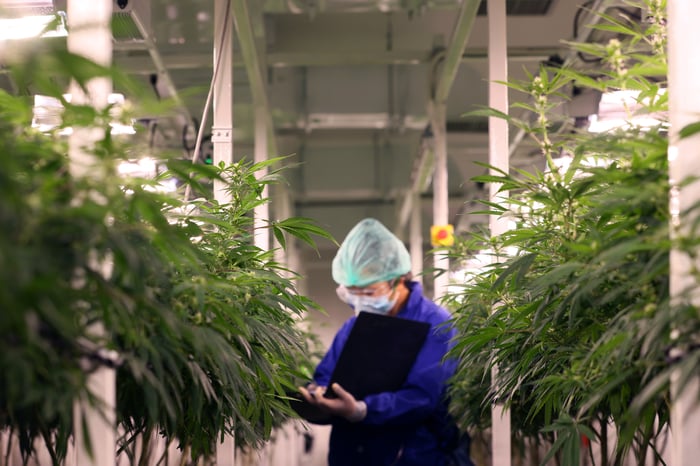The marijuana industry is expected to grow from $24 billion in sales in 2020 to $46 billion in 2026. Real estate investment trust (REIT) Innovative Industrial Properties (IIPR -0.82%) is a "picks and shovels" play on the space, as it owns the grow houses that will support that expansion in sales. That's not a bad position to take, as it allows the REIT to benefit regardless of which pot growers end up being winners. And yet there are some risks that need to be addressed. Here are some big ones to consider.
1. Tough to bank, but for how long?
One of the big problems for cannabis growing companies is the murky legal status of the drug. It is increasingly being legalized for both medicinal and recreational use in U.S. states, but it remains illegal at the federal level. There are rumors that this could change, but until it does, most financial institutions are likely to avoid the sector to ensure they don't run afoul of any laws. Innovative Industrial basically works to take advantage of this funding access problem.

Image source: Getty Images.
Essentially, the REIT buys grow houses from its customers in sale/leaseback transactions. The seller takes on a long-term lease, which is good for Innovative Industrial, and gets cash that it can use to build its business. If getting a loan is hard or expensive, this is a great option, even if the lease rates are steep.
As long as banks are locked out of the industry by legal concerns, Innovative Industrial, and a small number of peers, have a unique and successful model to ply. But there is an increasing effort to get cannabis legalized at the federal level. Once marijuana is legal, Innovative Industrial will likely start to face more competition and lower investment returns.
Its existing portfolio will likely hold up reasonably well (see below), but growth could be much slower in the future than it has been in the past. (The REIT's increasing portfolio size will also lead to slower growth, but that's less of a risk and more of a general fact of business life.)
2. Too many players
Another thing to consider about marijuana is that there's still something of a land grab going on, as small companies look to get as much market share as possible. There will be winners and losers, and it is probably too soon to figure out which companies will fall into which category. Innovative Industrial has a fairly diverse tenant list, so it will probably have some of each. In fact, one of the company's Tenants, Kings Garden, recently missed a rent payment, though the REIT and this tenant are in talks to resolve the issue.
Even if Innovative Industrial resolves the Kings Garden issue, the big picture is that the REIT may end up with vacant properties at some point. If that happens, there are options. Notably, getting approval to use a property as a grow house is a complex affair that usually results in the property, not the growing company, being designated as approved.
Thus, Innovative Industrial, based on the growth expectations in the industry, will probably be able to find a new marijuana tenant in a still growing industry. In a worst-case scenario, it can sell the asset and/or revert it back to a more standard industrial property, opening up more tenant options. Vacancies wouldn't be good, but they wouldn't be the end of the world either. And as long as they don't happen all at once, working through some occupancy headwinds here shouldn't be too hard.
3. Too much investment
The last big risk here is a bit nuanced. When Innovative Industrial buys a property or invests in expansion of an existing asset, it often puts in more cash than the building is worth. The value of this shows up as tenant improvements on the REIT's balance sheet.
This category of property "asset" accounts for just over a third of the company's real estate. The actual dollar value of this balance sheet item, at around $694 million at the end of the first quarter, is nearly as large as the buildings, which come in at $1.07 billion (land accounts for roughly $132 million).
The tenant basically rolls the costs of the improvements into its lease, leading to generous lease terms for Innovative Industrial. However, those improvements could end up getting written off if a property gets vacated, given that a new tenant would likely be unwilling to take on the old lease and pay for upgrades that already exist. Upgrades would probably be necessary for a new tenant to even be interested in using the property in the first place. That's a risk that's hard to quantify. Indeed, it is hard to tell which pot names will end up muddling through an industry shakeout versus, in a worst-case scenario, going bankrupt.
So far, this risk hasn't really been tested. And, like point two above, a lot would depend on the pace at which Innovative Industrial faced such headwinds. But it could materially exacerbate the vacancy issue even if the REIT can find new tenants.
For aggressive types
If Innovative Industrial's expectations for the growth of cannabis industry sales are close to accurate, there is ample room for expansion ahead. Eventually the REIT's model will get stress tested, and only then will there be a better picture of what the downside risk is here.
For now, Innovative is probably most appropriate for more aggressive investors willing to bet on the growth of a relatively new industry. The stock's yield today, after a material sell-off tied to some of the concerns above, is a huge 7.3%. If you have a strong stomach, and understand the risks you are taking on, that could present a worthwhile risk/reward balance.





